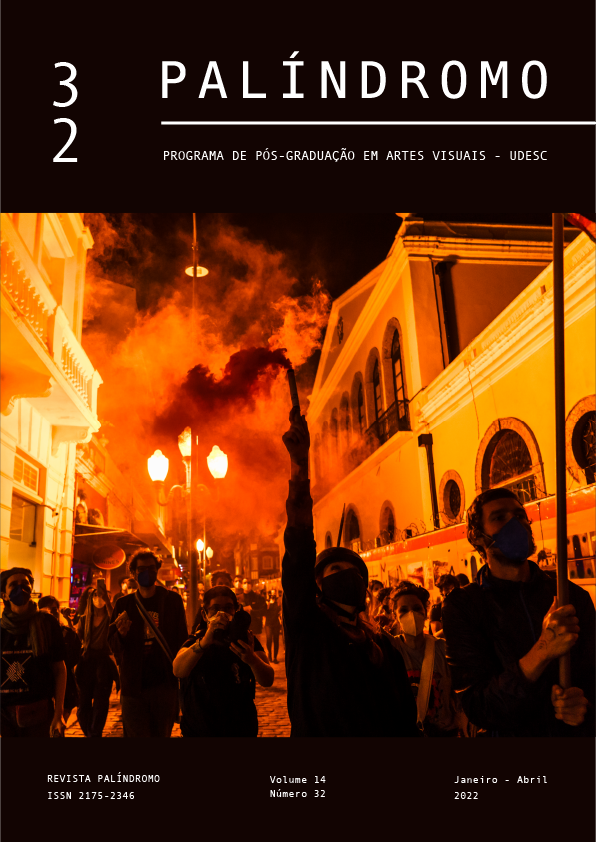Pibid arte: espaço contra-hegemônico na formação docente inicial e continuada
DOI:
https://doi.org/10.5965/2175234614322022168Palavras-chave:
Formação Docente, Pibid, Contra-hegemônico, Ensino de ArteResumo
O artigo é um recorte das análises preliminares acerca das ações do Pibid Arte da Universidade Federal do Vale do São Francisco, submetido ao Edital 02/2020. O intuito é demonstrar a importância do programa na qualificação do trabalho docente a partir do diálogo entre a formação inicial e continuada a partir do pressuposto de que suas ações atuam de forma contra-hegemônica ao modelo vigente de formação docente no Brasil. Fundamentado na Pedagogia Histórico-Crítica, o Pibid Arte, proporcionou aos/bolsistas e supervisores/a, no período de outubro de 2020 a abril de 2021, procedimentos metodológicos tais como: estudos sistematizados com leituras, palestras, observação da realidade escolar no ensino remoto, relatórios com o objetivo de analisar a dinâmica institucional, pedagógica e política que envolve a práxis docente. Os primeiros resultados apontam a incorporação de algumas atitudes a saber: a. prática investigativa sobre a realidade escolar e o contexto social e histórico dos estudantes; b. uma aproximação maior dos/as bolsistas com a escrita acadêmica; c. para o/a supervisor/a, registro e revisão da prática pedagógica; d. o reconhecimento do papel da escola e do professor na sistematização dos conhecimentos para a formação humana, destacando o ensino de arte e a especificidade de seus conteúdos. Por fim, conclui-se que o Pibid Arte é um espaço diferenciado para pensar as políticas de formação docente em Arte, sobretudo, se constituindo em um movimento de resistência contra a precarização do trabalho pedagógico em curso no país demonstrando possibilidades de pesquisas vindouras para o fortalecimento da docência.
Downloads
Referências
BRASIL. Coordenação de Aperfeiçoamento de Pessoal de Nível Superior. Edital n. 001/2011 CAPES. Programa Institucional de Bolsa de Iniciação à Docência. Editais e seleções. Disponível em: https://www.gov.br/capes/pt-br/acesso-a-informacao/
acoes-e-programas/educacao-basica/pibid/editais-e-selecoes. Acesso em: 14.set. 2016.
BRASIL. Decreto nº 7.219, de 24 de junho de 2010. Dispõe sobre o Programa Institucional de Bolsa de Iniciação à Docência – PIBID e dá outras providências. Diário Oficial da União, n. 120, seção 1, p. 4-5, 2010. Disponível em: http://www.planalto.gov.br/ccivil_03/_ato2007- 2010/2010/decreto/d7219.htm. Acesso em: 13 jul. 2016.
CAPES. Coordenação de Aperfeiçoamento de Pessoal de Nível Superior. Diretoria de formação de professores da Educação Básica/DEB. Relatório de gestão do PIBID. Brasília, 2013. Disponível em: https://www.capes.gov.br/images/banners/18092018_Relat%C3%B3rio_de_Gest%C3%A3o_CAPES_2017.pdf . Acesso em: jun. 2019.
CAPES. Portaria normativa nº 260, de 30 de dezembro de 2010. Dispõe da Normas Gerais do Programa Institucional de Bolsa de Iniciação à Docência – PIBID. Disponível em: http://www.capes.gov.br/educacaobasica/capespibiddownload/
Portaria260_PIBID2011_NomasGe- rais.pdf. Acesso em: 13 jul. 2016.
CAPES. Portaria Normativa nº 38, de 12 de dezembro de 2007. Dispõe sobre o Programa Institucional de Bolsa de Iniciação à Docência – PIBID. Diário Oficial da União, n. 239, seção 1, p. 39, 2007. Disponível em: https://www.capes.gov.br/images/stories/download/legislacao/Portaria_Normativa_38_PIBID.Acesso em: 13 jul. 2016.
CAPES. Decreto 6755, de 27 de janeiro de 2009. Institui a Política Nacional de Formação de Profissionais do Magistério da Educação Básica, disciplina a atuação da Coordenação de Aperfeiçoamento de Pessoal de Nível Superior - CAPES no fomento a programas de formação inicial e continuada, e dá outras providências. Brasília: MEC, 2009.
CAPES. Portaria nº 46, de 11 de abril de 2016. Aprova o Regulamento do Programa Institucional de Bolsa de Iniciação à Docência – Pibid. Disponível em: https://www.capes.gov.br/images/stories/download/legislacao/15042016-Portaria-46-Regulamento-PIBID-completa.pdf Acesso em 23 jul. 2016.
CANDAU, Vera Maria. Formação Continuada de Professores: Tendências Atuais. In: CANDAU, Vera Maria (org.). Magistério: construção cotidiana. Petrópolis. Rio de Janeiro: Vozes, 1998.
DOURADO, Luiz Fernandes. Diretrizes curriculares nacionais para a formação inicial e continuada dos profissionais do magistério da educação básica: concepções e desafios. Educação & Sociedade, Campinas, v. 36, nº. 131, pp. 299-324, abr/jun., 2015. DOI: https://doi.org/10.1590/ES0101-73302015151909
FELÍCIO, H. M. S. O PIBID como “terceiro espaço” de formação inicial de professores. Revista Diálogo Educacional, v. 14, n. 42, p. 415-434, maio/ago. 2014. Disponível em: https://periodicos.pucpr.br/index.php/dialogoeducacional/article/view/6587. Acesso em: jun. 2019. DOI: https://doi.org/10.7213/dialogo.educ.14.042.DS05
FRIGOTTO, Gaudêncio. Educação e crise do capitalismo real. São Paulo: Cortez, 1995.
FONSECA da SILVA, M.C.R. & HILLSHEIM, G.B.D. Políticas Públicas e formação docente em arte: confluências entre pesquisas. In: Simposio Latinoamericano de Formación de Profesores de Artes, 2013, Bogotá - Colombia. Anais... Bogotá -
Colômbia: Editora da Universidad Sérgio Arboleda, 2013. p. 253-264.
GRAMSCI, A. Os intelectuais e a organização da cultura. 9. ed. R.J.: Editora Civilização Brasileira, 1995.
GATTI, B. A.; BARRETO, E.; ANDRÉ, M. E. D. A. Políticas docentes no Brasil: um Estado da Arte. Brasília: UNESCO, 2011.
MARTINELLI, T. A. P.; ALMEIDA, E. M. Contribuições da concepção vigotskiana de arte para o ensino da cultura corporal. Universidade Estadual de Maringá – Maringá – PR.
SAVIANI, D. Pedagogia histórico-crítica: primeiras aproximações. 11ª ed. rev. Campinas, SP: Autores Associados, 1997.
SAVIANI, Demerval. Formação de professores: aspectos históricos e teóricos do problema no contexto brasileiro. Revista Brasileira de Educação, v. 14, n. 40, p. 143-155, jan./abr. 2009. www.conedu.com.br Disponível em: http://www.scielo.br/pdf/rbedu/v14n40/v14n40a12. Acesso em: 11 de junho de 2021. DOI: https://doi.org/10.1590/S1413-24782009000100012
VASQUEZ, Adolfo Sánchez. Filosofia da práxis. 2ª edição- Buenos AIRES: Consejo Latinomericano de Ciências Sociales- CLASCO: São Paulo: Expressão Popular, BRASIL, 2011.
Downloads
Publicado
Como Citar
Edição
Seção
Licença
Copyright (c) 2021 Janedalva Gondim

Este trabalho está licenciado sob uma licença Creative Commons Attribution 4.0 International License.
DECLARAÇÃO DE DIREITOS AUTORAIS
a. Os artigos publicados pela revista são de uso gratuito, destinados a aplicações acadêmicas e não comerciais. Todos os direitos autorais são atribuídos à revista. Os artigos cujos autores são identificados representam a expressão do ponto de vista de seus autores e não a posição oficial da Revista Palíndromo. O (s) autor (es) compromete-se sempre que publicar material referente ao artigo publicado no Palíndromo mencionar esta publicação da seguinte forma:
Este artigo foi publicado originalmente pela revista Palíndromo em seu volume (coloque o volume), número (coloque o número) no ano de (coloque o ano) e pode ser acessado em: http://www.revistas.udesc.br/index.php/palindromo
b. Plágio, em todas as suas formas, constitui um comportamento antiético de publicação e é inaceitável. A revista Palíndromo utiliza o software iThenticate de controle de similaridade


